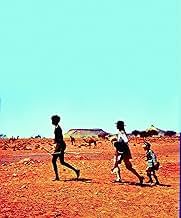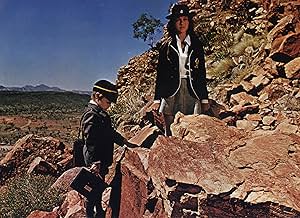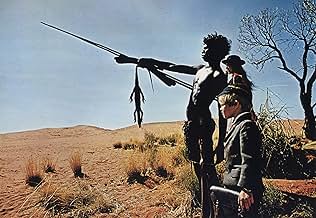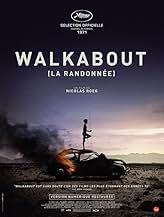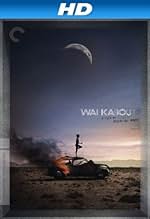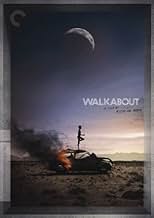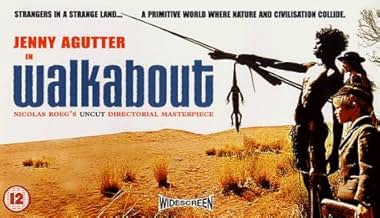CALIFICACIÓN DE IMDb
7.6/10
29 k
TU CALIFICACIÓN
Dos hermanos criados en la ciudad están varados en el interior de Australia, donde aprenden a sobrevivir con la ayuda de un niño aborigen.Dos hermanos criados en la ciudad están varados en el interior de Australia, donde aprenden a sobrevivir con la ayuda de un niño aborigen.Dos hermanos criados en la ciudad están varados en el interior de Australia, donde aprenden a sobrevivir con la ayuda de un niño aborigen.
- Dirección
- Guionistas
- Elenco
- Premios
- 1 premio ganado y 1 nominación en total
David Gulpilil
- Black Boy
- (as David Gumpilil)
Robert McDarra
- Man
- (as Robert McDara)
Peter Carver
- No Hoper
- (as Pete Carver)
Noeline Brown
- German Scientist
- (as Noelene Brown)
George Roubicek
- Radio Announcer
- (voz)
- (sin créditos)
- Dirección
- Guionistas
- Todo el elenco y el equipo
- Producción, taquilla y más en IMDbPro
Opiniones destacadas
A remarkably potent little film about a couple of very proper English kids who get lost in the Australian outback and hitch up with an aborigine boy on his initiation quest (or "walkabout"). My mom took me to see it when I was ten, and I've been haunted by it ever since. With some understated yet disturbing themes of alienation and violence, as well as the first scenes of full nudity I had ever witnessed on screen, I've sometimes wondered whether mom knew what she was getting into when she took me along. According to the trailer in the letterbox edition, Parents' Magazine recommended the film "without reservation" for young and old alike, because it depicts "facts of life." While that may be true, times have changed, and I can't imagine anyone today describing this subtle and unsettling story as "family fare." Incredibly tame, on its face, by today's standards of sensory overload, its essential world-weariness and maturity is no longer a didactic priority in our age of overconfidence. Watching it recently, I was on guard for signs of the myth of the "noble savage"--the hackneyed, simplistic, and generally hypocritical pretension that pre-industrial and non-Western peoples are morally superior to decadent moderns, which is demeaning to both modern and "savage" alike. There are instances of it here--most notably when a couple of rifle-toting, four-wheeling hunters decimate the landscape--but the overall emphasis is on the parallels between aborigine and Western life. Even scenes of the transience and decay of modern civilization are mirrored by the life-and-death cycles of the wilderness. With so many underlying similarities, the real question is why the teenaged English girl cannot embrace, figuratively and literally, the young black man who has saved her life and provided so selflessly for her, even while her younger brother, in all his innocence, has never doubted that they are a family. Is it race? Culture? Or does it reach to more fundamental questions of boy and girl, man and woman, human and human? This film has held up remarkably well over the past 30 years, and is well worth a look.
Walkabout (1971)
*** 1/2 (out of 4)
A girl (Jenny Agutter) and her young brother (Luc Roeg) find themselves in the Australian outback trying to survive after being left out there. Soon they run across a hunter (David Gulpilil) who is out there on a "walkabout."
Nicolas Roeg's WALKABOUT is without question one of the greatest looking films that you're ever going to see. I've often said that this film did for the outback what Stanley Kubrick's 2001: A SPACE ODDYSEY did for space. I mean, whenever you think of a dessert setting your mind can't help but go to the images on display throughout this poetic look at struggle.
For my money the greatest thing done by Roeg is just the atmosphere and setting that he creates. There's not too much dialogue but what really moves the film is the beautiful music score and cinematography. The images that we view are breathtaking from the opening scenes to the closing ones. The stuff in the outback is beautifully captured and there's no doubt that the setting comes to life. The music score also perfectly captures the innocence and beauty of everything going on.
The performance by the three leads are another major plus. Agutter rightfully became a name after this picture and it's easy to see why. The role here certainly isn't flashy but the actress is able to do so much with such little dialogue. Her eyes certainly tell you everything you need to know and there's a very intelligent performance. You can see her intelligence without her saying a word. Both Roeg and Gulpili are equally as great in their supporting roles.
WALKABOUT is certainly a very poetic film that has some of the greatest images that you're ever going to see. It's really a film full of life and the way it plays out holds your attention from start to finish.
*** 1/2 (out of 4)
A girl (Jenny Agutter) and her young brother (Luc Roeg) find themselves in the Australian outback trying to survive after being left out there. Soon they run across a hunter (David Gulpilil) who is out there on a "walkabout."
Nicolas Roeg's WALKABOUT is without question one of the greatest looking films that you're ever going to see. I've often said that this film did for the outback what Stanley Kubrick's 2001: A SPACE ODDYSEY did for space. I mean, whenever you think of a dessert setting your mind can't help but go to the images on display throughout this poetic look at struggle.
For my money the greatest thing done by Roeg is just the atmosphere and setting that he creates. There's not too much dialogue but what really moves the film is the beautiful music score and cinematography. The images that we view are breathtaking from the opening scenes to the closing ones. The stuff in the outback is beautifully captured and there's no doubt that the setting comes to life. The music score also perfectly captures the innocence and beauty of everything going on.
The performance by the three leads are another major plus. Agutter rightfully became a name after this picture and it's easy to see why. The role here certainly isn't flashy but the actress is able to do so much with such little dialogue. Her eyes certainly tell you everything you need to know and there's a very intelligent performance. You can see her intelligence without her saying a word. Both Roeg and Gulpili are equally as great in their supporting roles.
WALKABOUT is certainly a very poetic film that has some of the greatest images that you're ever going to see. It's really a film full of life and the way it plays out holds your attention from start to finish.
Goodness gracious it's amazing how many reviewers missed the most obvious aspect of the film. This tale is about innocence and it approaches that from many different angles. As for Roeg practicing camera tricks-maybe today these are tricks but at the time the style was a pioneering method of telling and showing psychological elements, wasted on todays audiences. Roeg presents innocence in juxtaposition with the hardness and neuroses of society, not as WHITEMAN BAD but as society, modern society makes us very neurotic by taking away our innocence. Roeg makes an brilliant point and stylizes a mostly nonverbal experience by letting us journey with children all on the cusp of some new stage of growth. This movie is a small masterpiece!!
Although this is a sound film, and the characters talk to one another, this film could have been made just as well in the 1920s. It does not really need sound.
The film is about nature, and man's relationship with it. If a civilised person were left out in the desert, then they would soon die. But, as this film shows, there are people and creatures living out there quite happily.
The film has been criticised for having a weak beginning and a weak end. But where does the story of this film start? And where and when would you end it? Yes you can end it when the two children get back to civilisation. But does the story end there? No. Because of their experiences, things are never going to be the same again. And for them, the story has not finished, it is only just beginning.
I have seen this film several times and I notice something different every time I see it.
The film is about nature, and man's relationship with it. If a civilised person were left out in the desert, then they would soon die. But, as this film shows, there are people and creatures living out there quite happily.
The film has been criticised for having a weak beginning and a weak end. But where does the story of this film start? And where and when would you end it? Yes you can end it when the two children get back to civilisation. But does the story end there? No. Because of their experiences, things are never going to be the same again. And for them, the story has not finished, it is only just beginning.
I have seen this film several times and I notice something different every time I see it.
A teenaged girl (ever-lovely Jenny Agutter) and her young brother (Lucien John, a.k.a. Luc Roeg, the directors' son) are stranded in the desolate Australian outback. They really have no clear idea of where to go or what to do, but they meet a stranger who saves their lives. He is an aborigine (Aussie icon David Gulpilil) who is partaking in the ritual known as "Walkabout", wherein he temporarily leaves his tribe to go off on his own and live off the land.
The experiences between these three young people form the balance of this excellent film. The culture clash is immediate, as the two urbanized white kids struggle to make themselves understood by the aborigine. But they ultimately become rather inseparable.
Along the way, they encounter all sorts of flora and fauna. "Walkabout" is highly noteworthy for its respect for Nature, and is filled with many visual wonders. Given that director Nicolas Roeg had been a camera operator and cinematographer, it's no surprise that the film *looks* beautiful, and it's set to a haunting and lovely John Barry score.
Three highly engaging performances anchor the film. Agutter has a naturally sexy presence, and Roeg doesn't miss opportunities to let the camera take in every aspect of her body. His son does a nice job as the brother, avoiding being overly cutesy and always relaxed on screen. Gulpilil proved to be a real find in his film debut. Another Aussie favourite, John Meillon, appears briefly as the white kids' father.
"Walkabout" was largely improvised. The Edward Bond script, based on a novel by Donald G. Payne, was actually only 14 pages or so. Knowing this, it makes the acting that much more impressive, as the cast react instinctively to the scenes & settings.
Overall, this is one of *the* iconic Australian films, and is a must-see for movie lovers interested in cinema from this part of the world.
Eight out of 10.
The experiences between these three young people form the balance of this excellent film. The culture clash is immediate, as the two urbanized white kids struggle to make themselves understood by the aborigine. But they ultimately become rather inseparable.
Along the way, they encounter all sorts of flora and fauna. "Walkabout" is highly noteworthy for its respect for Nature, and is filled with many visual wonders. Given that director Nicolas Roeg had been a camera operator and cinematographer, it's no surprise that the film *looks* beautiful, and it's set to a haunting and lovely John Barry score.
Three highly engaging performances anchor the film. Agutter has a naturally sexy presence, and Roeg doesn't miss opportunities to let the camera take in every aspect of her body. His son does a nice job as the brother, avoiding being overly cutesy and always relaxed on screen. Gulpilil proved to be a real find in his film debut. Another Aussie favourite, John Meillon, appears briefly as the white kids' father.
"Walkabout" was largely improvised. The Edward Bond script, based on a novel by Donald G. Payne, was actually only 14 pages or so. Knowing this, it makes the acting that much more impressive, as the cast react instinctively to the scenes & settings.
Overall, this is one of *the* iconic Australian films, and is a must-see for movie lovers interested in cinema from this part of the world.
Eight out of 10.
¿Sabías que…?
- TriviaLuc Roeg was actually sun-burnt in the scene where the aboriginal boy treats his back by rubbing him with fat from a wild boar. Director Nicolas Roeg thought it would make a good scene for the film so he picked up the camera and shot it.
- ErroresThe credits name the actor playing "Black Boy" as David Gumpilil. It should be David Gulpilil.
- Citas
Narrator: [last lines - from "Poem XL" by A.E. Housman's "A Shropshire Lad"] Into my heart an air that kills, From yon far country blows: What are those blue remembered hills, What spires, what farms are those? That is the land of lost content, I see it shining plain, The happy highways where I went, And cannot come again.
- Créditos curiososAfter the credits, there is a flash of white light on the screen and as it becomes a black screen, radio tuning is heard while the words "rien ne va plus" are shown.
- Versiones alternativasA director's cut of this movie was released in 1997 with 5 additional minutes. This cut is identical to the original British release version (100 minutes): the film was shortened by five minutes for its original American release.
- ConexionesEdited into Terror Nullius (2018)
- Bandas sonorasElectronic Dance
Written and performed by Billy Mitchell
Selecciones populares
Inicia sesión para calificar y agrega a la lista de videos para obtener recomendaciones personalizadas
- How long is Walkabout?Con tecnología de Alexa
Detalles
- Fecha de lanzamiento
- Países de origen
- Idiomas
- También se conoce como
- Walkabout
- Locaciones de filmación
- Productoras
- Ver más créditos de la compañía en IMDbPro
Taquilla
- Presupuesto
- AUD 1,000,000 (estimado)
- Total a nivel mundial
- USD 1,888
Contribuir a esta página
Sugiere una edición o agrega el contenido que falta


